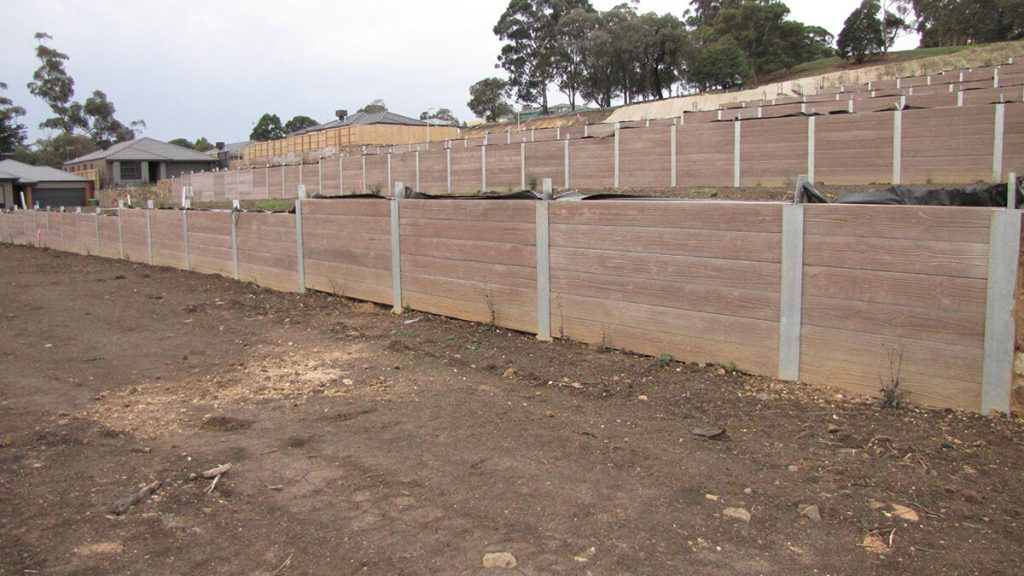Retaining Walls: Concrete vs. Timber

If you’re looking to renovate your house or build a new one, you’ve probably come across various construction firms offering retaining wall building services. But for the uninitiated, the concept of a retaining wall may be foreign, and the wide range of options available may confuse you. Without any subject matter knowledge, you’re unlikely to know which type of retaining wall is best for your property, and this can lead to you being fleeced by unscrupulous contractors.
Fret not, however, because we’re going to break things down for you. In this blog, you’ll learn about the function of retaining walls as well as the pros and cons of the different types of retaining walls.
What Do Retaining Walls Even Do?
To understand the differences between the different types of retaining walls, you need to first understand the function of a retaining wall. A retaining wall, at its core, is essentially just a structure that is put in place to keep soil behind it. This protects the soil behind the retaining wall from erosion and can allow you to segment your backyard or land into separate, clearly demarcated sections. A retaining wall can prove especially useful if your land is sloped or inclined, as having one can help to create separate flat sections at different heights, giving you more usable space to work with for your landscaping needs.
Retaining walls can be made from a wide range of materials, including anything from concrete and bricks to timber and stone. Each material has its pros and cons, and your choice of material for your retaining wall can affect several things, such as the amount of weight it can hold and the longevity of your retaining wall. In this blog post, however, we won’t bore you with the dry, technical details about the different types of retaining walls. Instead, we’ll be zooming in on the two most common types of retaining walls we build for our clients, namely concrete sleeper retaining walls and timber sleeper retaining walls. We’ll analyse the pros and cons of each type so that you’ll be better able to determine which one is more suitable for your needs.
Concrete Sleeper Retaining Walls
Concrete sleeper retaining walls, as the name suggests, are built out of concrete. When constructed by professionals, concrete sleeper retaining walls have one of the longest lifespans out of all the different types of retaining walls available and can easily last more than 15 to 20 years with proper maintenance and care.
Additionally, concrete is also one of the strongest and most durable retaining wall building materials available. This means that concrete sleeper retaining walls can withstand a substantial amount of weight. Unlike retaining walls that are built from timber, concrete is also non-biodegradable and will not be subject to warping or rotting. As such, this makes concrete sleeper retaining walls the obvious choice if you are in the market for a long-lasting retaining wall that can bear a large load.
However, concrete sleeper retaining walls are not without their downsides as well. One key downside is that concrete retaining walls have larger profiles, thus requiring more space and rendering them unsuitable for smaller properties or backyards. Additionally, the process of building a concrete sleeper retaining wall is far more complex than a timber sleeper retaining wall, meaning that it is next to impossible for you to do it yourself, and it will also cost more to build than a timber retaining wall.
Timber Sleeper Retaining Walls
Timber sleeper retaining walls, on the other hand, are much easier to build and repair. Because of this, they also tend to be cheaper to build than concrete sleeper retaining walls and may hence be a better option for the budget-conscious home builder.
However, if your timber does not receive proper treatment, it will be susceptible to rotting or warping after a few years and this can create an eyesore in your backyard. This might even happen sooner, especially if your timber sleeper retaining wall is not properly constructed. As such, you should engage professional retaining wall builders if you are looking to construct a timber sleeper retaining wall for your backyard or property. Attempting to do it yourself might yield a decent result in the short term, but you will most definitely begin to regret it when your retaining wall starts to break down and all your landscaping efforts go to waste after a few years.
Concrete vs. Timber?
You might still be wondering: should I go for a concrete or timber retaining wall? Unfortunately, there is no simple answer to that question. It ultimately depends on what you value most in a retaining wall. Whilst both concrete and timber retaining walls essentially serve the same purpose, there are a few key areas where they differ. Check out this table we’ve come up with to help you better visualise the differences between concrete and timber sleeper retaining walls.
| Concrete Sleeper Retaining Walls | Timber Sleeper Retaining Walls | |
| Longevity | More than 15-20 years | 15-20 years |
| Durability | Most durable retaining wall material and can withstand substantial loads | Highly durable if properly constructed |
| Cost | More costly | More budget-friendly |
| Downsides | Occupies a larger space | Timber may rot or warp over time |
Fundamentally, when deciding between concrete and timber sleeper retaining walls, you need to first determine what it is that you value more. Both types of retaining walls have their aesthetic appeal, so it mainly comes down to price and longevity. If you are willing to shell out more money upfront for a longer-lasting, lower maintenance retaining wall, then concrete is the way to go. But if you’re more budget-conscious and want something that occupies less space, then timber is for you.
How We Can Help
At the end of the day, regardless of whether you choose to go with a concrete or timber sleeper retaining wall, your interests will be better served with retaining wall specialists building your retaining wall. TFR Construction is the premier retaining wall contractor in the Melbourne area and provides expert retaining wall construction services to both residential and commercial properties. If you need a retaining wall built, don’t hesitate to contact us for a no-obligation consultation today!
Recent Posts
A Parcel for the Picking – Things to Consider When Buying Land for Your Home
Selecting the proper parcel of land might be challenging but approaching the task with the correct knowledge makes it worthwhile.
Stone Landscaping: Adding Statement Stone and Boulders to Your Landscape
Stone landscaping is low maintenance, sustainable, and extremely versatile. Here is a realistic view of the main pros and cons of stone landscaping.
5 Ways to Beautify Your Sleeper Retaining Walls
In this blog post, we examine how you can combine looks and function with the latest designs of retaining walls available today.
How Sleeper Retaining Walls Can Help with Property Water Drainage Systems
We take a closer look at why retaining walls can be a fantastic solution for redirecting water around the house and protecting your foundation.
What Is a Commercial Contractor?
Contractors who work on commercial buildings have the know-how, expertise, and certifications to handle commercial construction work. But what exactly is a commercial contractor, and do you need one for your next project? Read on to find out if a commercial contractor is right for you.
Recent Posts
A Parcel for the Picking – Things to Consider When Buying Land for Your Home
Selecting the proper parcel of land might be challenging but approaching the task with the correct knowledge makes it worthwhile.
Stone Landscaping: Adding Statement Stone and Boulders to Your Landscape
Stone landscaping is low maintenance, sustainable, and extremely versatile. Here is a realistic view of the main pros and cons of stone landscaping.
5 Ways to Beautify Your Sleeper Retaining Walls
In this blog post, we examine how you can combine looks and function with the latest designs of retaining walls available today.
How Sleeper Retaining Walls Can Help with Property Water Drainage Systems
We take a closer look at why retaining walls can be a fantastic solution for redirecting water around the house and protecting your foundation.
What Is a Commercial Contractor?
Contractors who work on commercial buildings have the know-how, expertise, and certifications to handle commercial construction work. But what exactly is a commercial contractor, and do you need one for your next project? Read on to find out if a commercial contractor is right for you.





